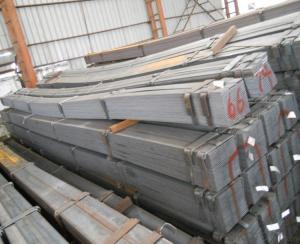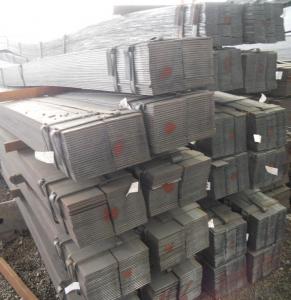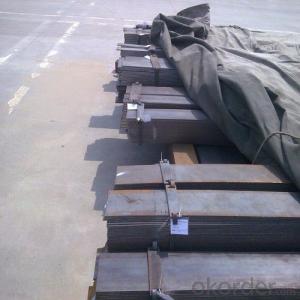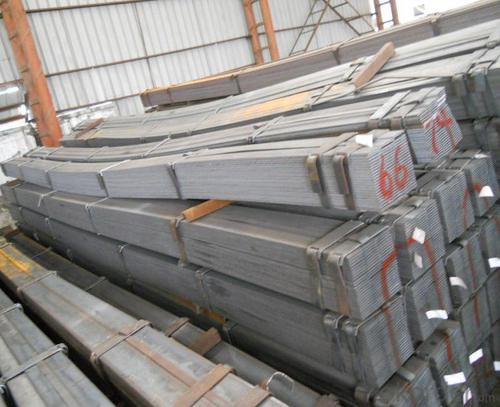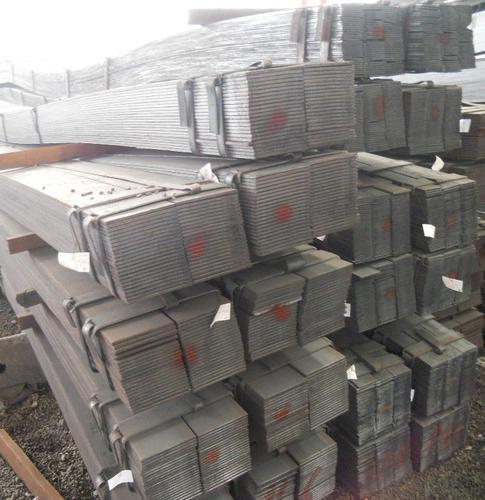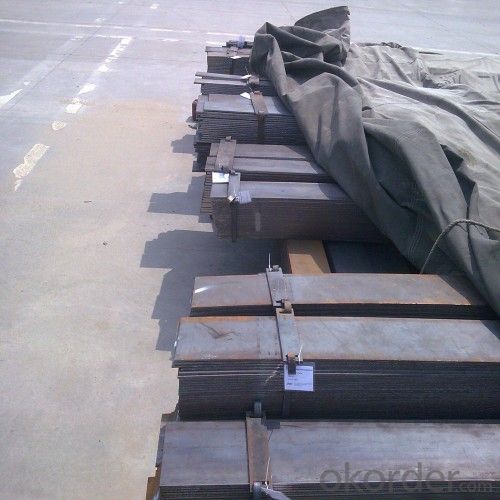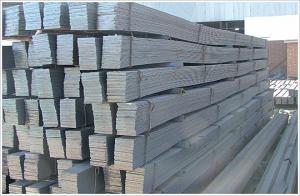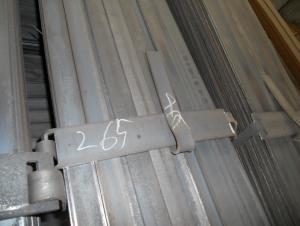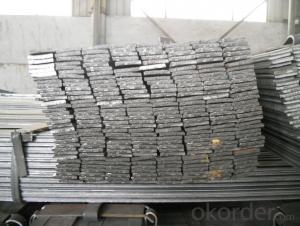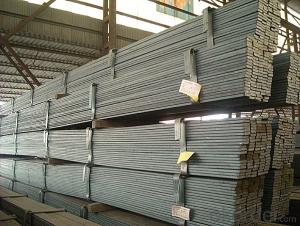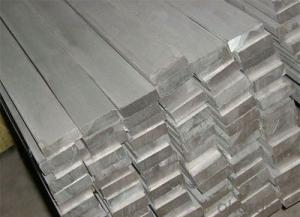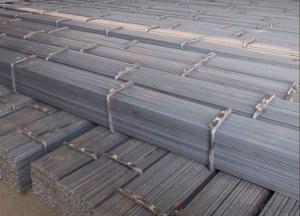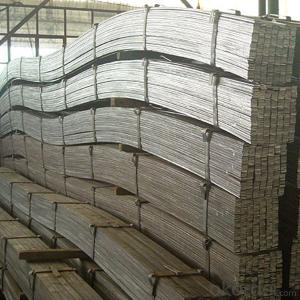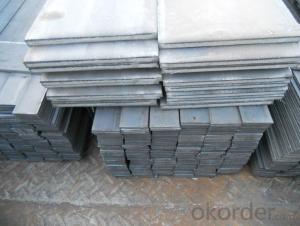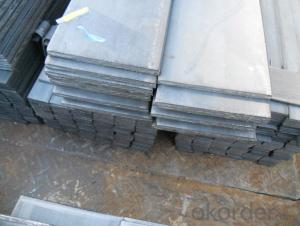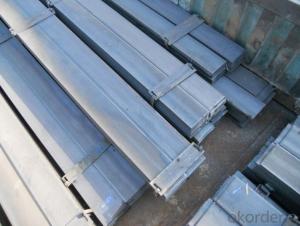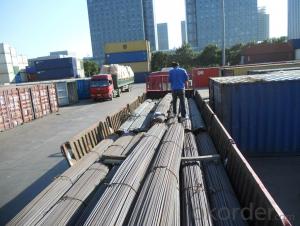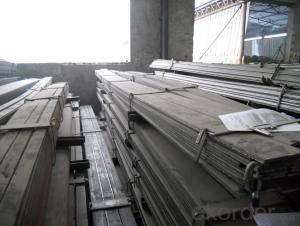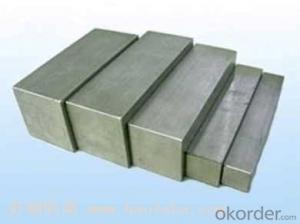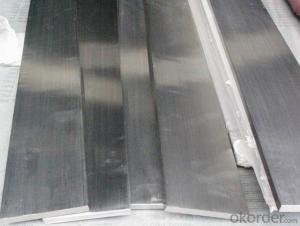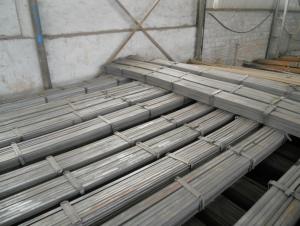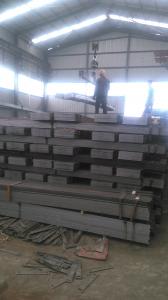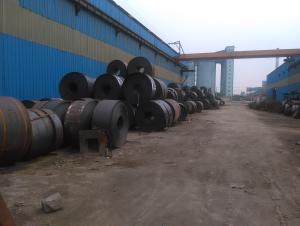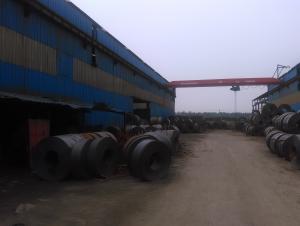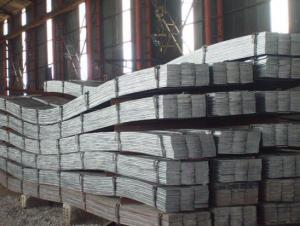High Quality Mild Steel Flat Bar with Grade Q235
- Loading Port:
- Tianjin
- Payment Terms:
- TT OR LC
- Min Order Qty:
- 25 m.t.
- Supply Capability:
- 100000 m.t./month
OKorder Service Pledge
OKorder Financial Service
You Might Also Like
Specification of Steel Flat Bar
Commodity: Carbon Steel Flat Bar
Standard: GB,JIS,ASTM,
Material: Q235,SS400 or Equivalent
Brand name: FLATSPACE
Origin place: China
Thickness: 3mm-30mm
Width:20mm-200mm
Length: Max 12m
Certification: SGS/BV
Chemical composition of Q235
Alloy No | Grade | Element(%) | ||||
C
| Mn
| S
| P
| Si
| ||
Q235
|
B
|
0.12—0.20 |
0.3—0.7 |
≤0.045 |
≤0.045
|
≤0.3
|
Physical properties of Q235
Alloy No | Grade | Yielding strength point(Mpa) | Tensile strength (Mpa) | Elongation after fracture(%) | ||||||
Thickness (mm) | Thickness (mm) | |||||||||
≤16 | >16--40 | >40--60 | >60--100 | ≤16 | >16--40 | >40--60 | >60--100 | |||
≥ | ≥ | |||||||||
Q235 |
B |
235 |
225 |
215 |
205 |
375--500 |
26 |
25 |
24 |
23 |
Above sheets show the technical data of Q235,we can also provide other materials similar to Q235.
Usage/Applications of Steel Flat Bar
Widely used for construction;
Machinery manufacturing;
Iron tower steel structure;
Shipbuilding; Steel grating;
Staircase;
Bridge;
Viaduct;
Railway spare parts;
Boilers making etc.
Packaging & Delivery of Steel Flat Bar
Packaging Details: The Steel Flat Bars are packed in bundles and loaded in 20 feet/40 feet container, or shipped by bulk cargo ,also we can do as customer's requirements.
Delivery Details:30~45 days upon the receipt of buyer payment by T.T. or L/C.
- Q: Are steel flat bars suitable for the construction of retail spaces or shopping centers?
- Yes, steel flat bars are suitable for the construction of retail spaces or shopping centers. They are strong, durable, and can be easily fabricated and installed. Steel flat bars also provide stability and support to the structure, making them an ideal choice for commercial construction projects.
- Q: What is the maximum length-to-height ratio for steel flat bars?
- The maximum length-to-height ratio for steel flat bars is determined by various factors such as the specific steel grade, manufacturing process, and industry standards. However, in general, the length-to-height ratio for steel flat bars typically ranges from 6:1 to 12:1. This means that the length of the flat bar can be up to 6 to 12 times its height. It is important to note that exceeding these ratios may result in reduced structural integrity and increased risk of buckling or bending. Therefore, it is crucial to consult relevant industry standards and engineering guidelines to ensure safe and efficient usage of steel flat bars in different applications.
- Q: Are steel flat bars suitable for fabrication of frames or structures?
- Yes, steel flat bars are suitable for the fabrication of frames or structures. Steel is a strong and durable material, and flat bars provide stability and support for various applications. They are commonly used in construction, manufacturing, and engineering projects. Steel flat bars offer excellent load-bearing capacity, resistance to bending and warping, and can be easily welded or bolted together to create frames and structures of various sizes and shapes. Additionally, steel flat bars are cost-effective and readily available in different grades and sizes, making them a versatile choice for fabricating frames or structures.
- Q: What are the maximum allowable spans for steel flat bars?
- The maximum allowable spans for steel flat bars can vary depending on several factors such as the load applied, the type of steel, and the intended use. Generally, the maximum allowable span for steel flat bars is determined by considering the deflection, bending stress, and safety factors. For smaller loads and lighter applications, steel flat bars can have maximum allowable spans ranging from a few feet to several feet. However, for heavier loads and structural applications, the maximum allowable spans may be significantly reduced to ensure structural integrity and prevent excessive deflection. To determine the maximum allowable span for steel flat bars, engineers and designers use various calculations and design codes such as the American Institute of Steel Construction (AISC) standards. These standards provide guidelines on the maximum allowable stress, deflection limits, and safety factors to be considered when determining the span for steel flat bars. It is important to consult with a structural engineer or refer to relevant design codes and standards to determine the specific maximum allowable spans for steel flat bars based on the specific application and load requirements.
- Q: Are steel flat bars suitable for machining or drilling?
- Steel flat bars are indeed suitable for machining and drilling. Steel is a strong and durable material that can be easily shaped, cut, and drilled into various forms. Flat bars, in particular, provide a stable and rigid surface for machining operations, allowing for precise and accurate cuts. With the right tools and techniques, steel flat bars can be easily drilled to create holes of different sizes and shapes. Whether it is for creating prototypes, constructing machinery, or any other application that requires precise shaping and drilling, steel flat bars are a reliable choice.
- Q: Galvanized steel flat welding occurs after the material itself crack.
- Cold crack: a cold crack is a weld crack that occurs when the joint is cooled to a lower temperature. The causes are the quenching tendency, the residual stress, the diffusion hydrogen content of the weld metal and the heat affected zone.
- Q: Can steel flat bars be cold formed or hot rolled?
- The desired outcome and application determine whether steel flat bars are cold formed or hot rolled. Cold forming involves shaping the steel at or slightly below room temperature, typically through bending or rolling. This technique is preferred when precise shapes or sizes are necessary, as it provides greater control and accuracy in the final product. On the other hand, hot rolling entails heating the steel beyond its recrystallization temperature and then passing it through rollers to achieve the desired shape. This method is commonly employed to produce large quantities of steel bars rapidly and efficiently. Hot rolled steel flat bars are renowned for their strength and durability, making them suitable for a wide range of industrial and structural applications. To sum up, steel flat bars can be cold formed or hot rolled, with each approach offering distinct advantages based on the intended usage.
- Q: What are the different cutting methods for steel flat bars?
- There are several cutting methods for steel flat bars, including sawing, shearing, and plasma cutting. Sawing involves using a saw blade to cut through the bar, while shearing uses a shearing machine to trim the material. Plasma cutting, on the other hand, involves using a high-temperature plasma torch to melt and separate the steel. Each method has its own advantages and is suitable for different applications and requirements.
- Q: Can steel flat bars be used for manufacturing tools?
- Yes, steel flat bars can be used for manufacturing tools. Steel flat bars are commonly used in tool manufacturing due to their high strength, durability, and versatility. These bars can be easily shaped and machined into various tool designs, making them suitable for a wide range of applications. Steel flat bars are also known for their resistance to wear and tear, making them ideal for tools that require frequent use and contact with hard materials. Additionally, steel flat bars can be heat-treated to enhance their mechanical properties, such as hardness and toughness, further improving their suitability for tool manufacturing.
- Q: What are the maximum temperature limits for steel flat bars?
- The maximum temperature limits for steel flat bars can vary depending on the specific grade of steel being used. However, in general, most steel flat bars can withstand temperatures up to around 1000°C (1832°F) without significant structural damage.
Send your message to us
High Quality Mild Steel Flat Bar with Grade Q235
- Loading Port:
- Tianjin
- Payment Terms:
- TT OR LC
- Min Order Qty:
- 25 m.t.
- Supply Capability:
- 100000 m.t./month
OKorder Service Pledge
OKorder Financial Service
Similar products
Hot products
Hot Searches
Related keywords
